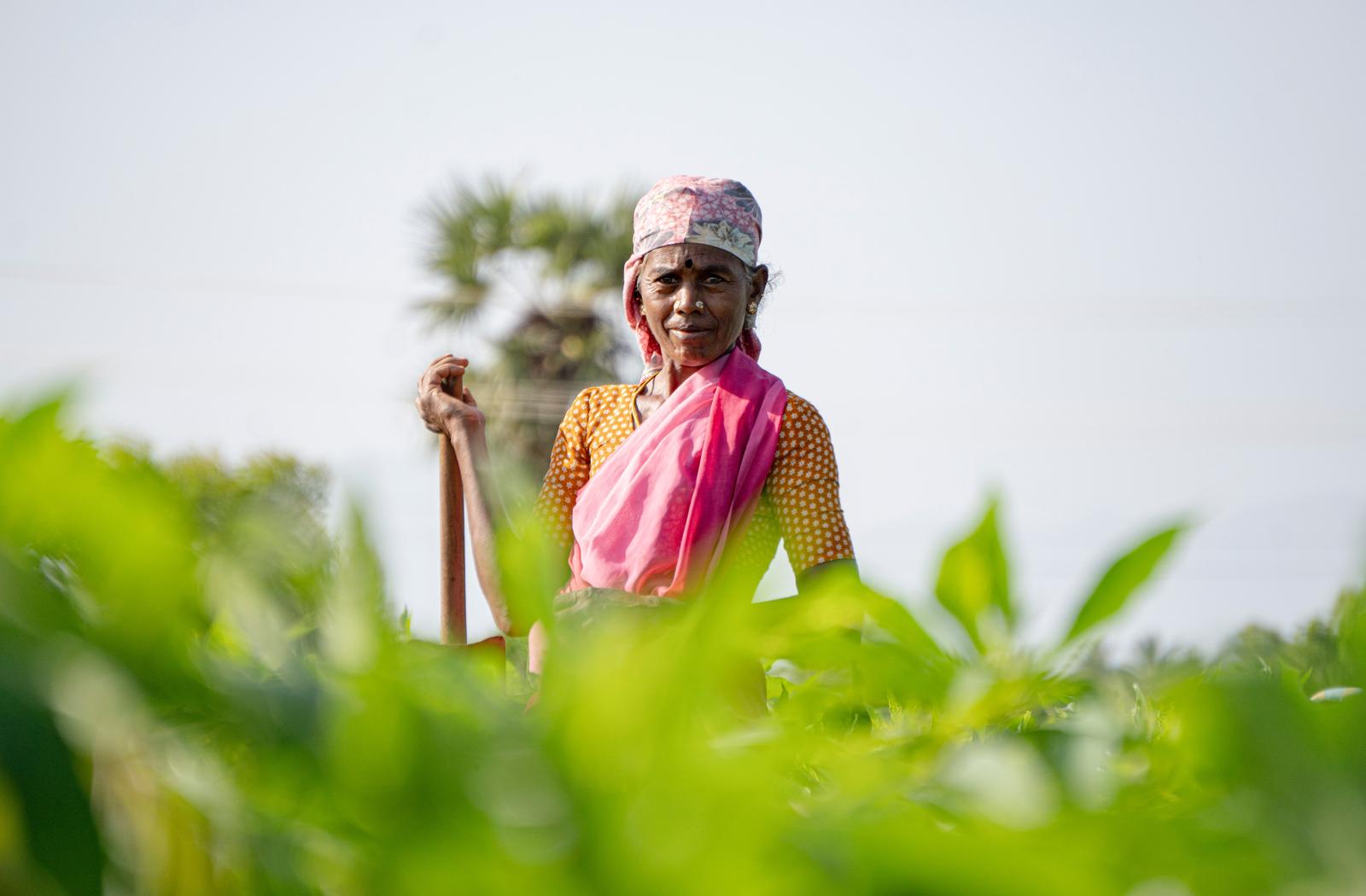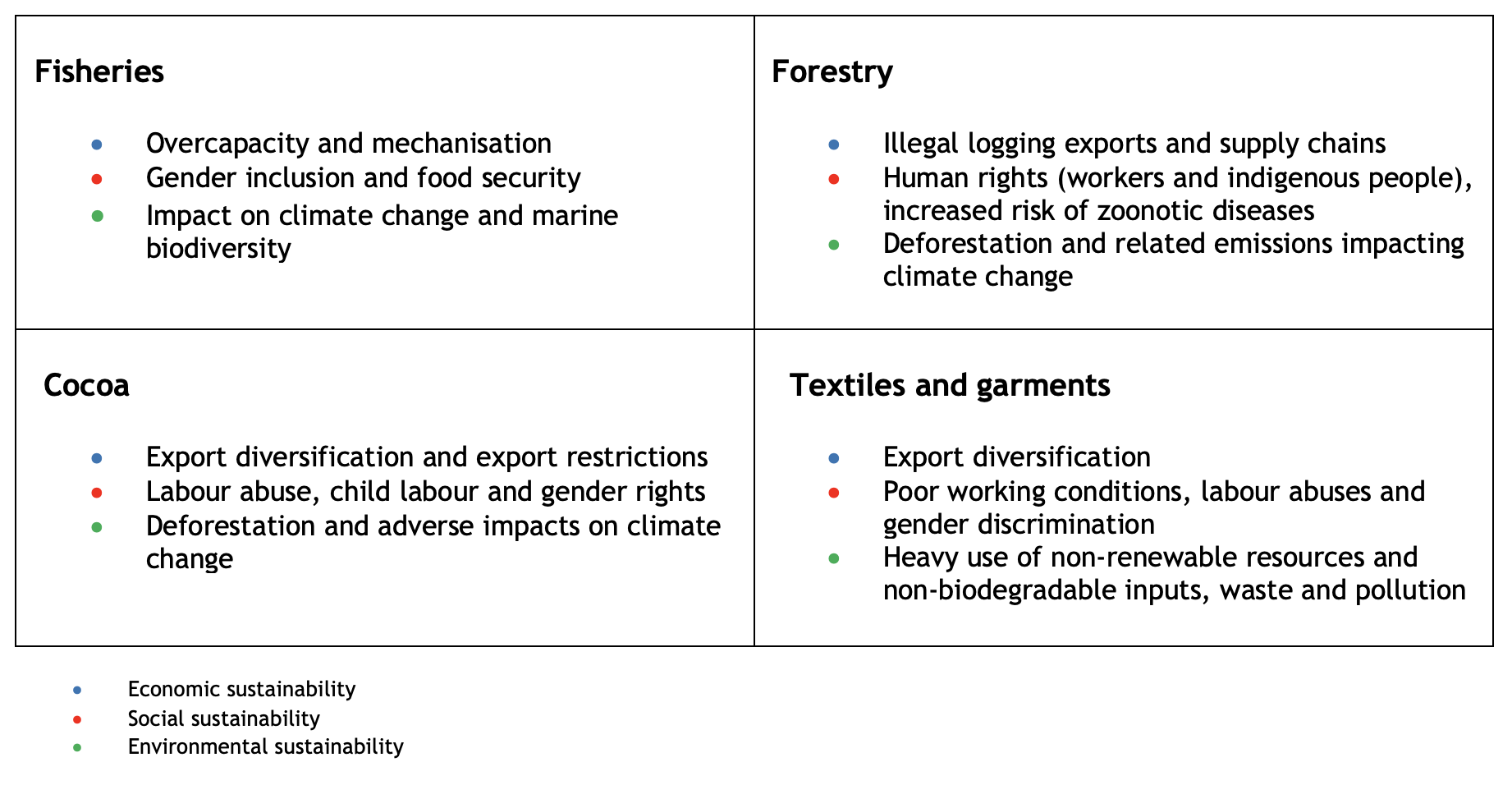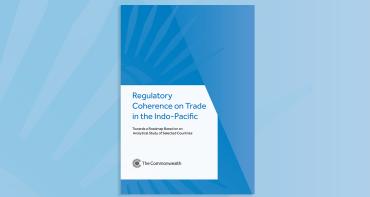International trade can be a driver of inclusive economic growth and a means to achieve the Sustainable Development Goals (SDGs). To promote sustainability across the economic, social and environmental dimensions, trade policies have been evolving at the domestic and international levels.

Blog by Brendan Vickers, Head of International Trade Policy Section, Salamat Ali, Economic Adviser, and Kartikeya Garg, Assistant Research Officer, Commonwealth Secretariat
The Commonwealth’s 56 member countries have been at the forefront of this evolution, committing to achieving sustainable development as early as the 1989 Langkawi Declaration, and reaffirming this in 2013 by adopting the Commonwealth Charter. Furthermore, in 2018, they launched the Commonwealth Blue Charter, followed by the Living Lands Charter in 2023.
On the occasion of the second Commonwealth Trade Ministers Meeting on 5-6 June 2023, a new book by the Commonwealth Secretariat 'Sustainable Production and Trade: Perspectives from the Commonwealth' examines sustainable production and trade practices and governance arrangements in four sectors: cocoa, fisheries, forestry, and textiles and garments. This blog explores some of the sustainability challenges in each sector and highlights measures to address these across the Commonwealth.
Importance of the four sectors
These sectors hold significant importance to Commonwealth members, as reflected in their average export share from 2019 to 2021: 16% for fisheries, about 20% for forestry, nearly 16% for cocoa, and 14.5% for textiles and garments. All four sectors are labour intensive, making them crucial to the economic growth and job creation in developing countries, particularly in least developed countries (LDCs) and small states.
The importance of these sectors is also highlighted by their high trade reliance in various geographical regions of the Commonwealth:
- The fisheries sector is critical to exports from small island developing states (SIDS) and low-income coastal states, with its contribution to merchandise trade ranging between 60-90% for countries such as Maldives, Kiribati, Nauru and Vanuatu.
- Forests cover more than 90% of land area in Gabon, Guyana and the Solomon Islands, while Canada and New Zealand dominate forestry exports.
- Some of the largest cocoa producers in the world are in the Commonwealth, with Ghana and Cameroon accounting for almost 9% and 7.3% of global production.
- The textiles and garments sector is a mainstay of income and employment and exports in Commonwealth countries in South Asia (such as India, Bangladesh and Sri Lanka).
Sustainability challenges across the four sectors
Each sector faces unique socio-economic and environmental sustainability challenges (Figure 1). These include over-exploitation of natural resources through mechanised fishing practices, illegal logging, deforestation driven by cocoa plantations, and employing water- and energy-intensive techniques to manufacture textiles and garments. They also have vast environmental footprints, contributing significantly to global carbon emissions, biodiversity loss and ecosystem disturbances. Additionally, they face social sustainability challenges such as harmful labour practices, poor working conditions and gender inclusion issues. Due to their ‘buyer-driven’ character, they also face some common sustainability challenges, and adopt similar approaches to address them.
Figure 1. Main economic, social and environmental sustainability challenges

Common approaches to promoting sustainability
- Incorporating specific sustainability provisions into trade agreements including declarative clauses (such as referencing GATT Article XX or GATS Article XIV) and establishing specific work programmes for priority areas (e.g., Canada-Colombia FTA containing work programmes on forestry management) or sector-specific bilateral or regional agreements (e.g.US-Cambodia Textile Trade Agreement). They are also specific provisions containing legally binding commitments on improving labour standards and environmental protection, as well as complying with international standards (e.g., EU-CARIFORUM and UK-CARIFORUM Agreements).
- Enhancing transparency and traceability across supply chains can assist suppliers to meet their regulatory requirements related to transparency, demonstrate compliance with standards, monitor supply chain conditions, and assess environmental impacts associated with production.
- Voluntary Sustainability Standards (VSS) in the form of private standards, certification and labelling are commonly used across all four sectors. They specify requirements that producers and traders need to meet to ensure sustainable and responsible production practices.
- Recognising the rights and traditional practices of indigenous peoples and small-scale fishers, farmers and manufacturers ensures that the most vulnerable benefit from the transition to greater sustainability. Small-scale fishers use non-mechanised fishing techniques that are less fuel-intensive, and the land owned by indigenous people has significantly lower rates of deforestation as compared to state or privately-managed lands. Similarly, integrating small-scale cocoa farmers and textile producers into existing value chains has raised their incomes and help promote economic and social sustainability.
Commonwealth member countries have implemented various pan-Commonwealth co-operation initiatives to promote sustainable fisheries and forestry management and address climate change (Figure 2).
Figure 2. Examples of pan-Commonwealth sustainability initiatives

The way forward
Four key actions can help to promote sustainable production and trade in these sectors:
- Tariff reform and promotion of processing industries in producer countries: Addressing tariff escalation for processed agricultural products can facilitate the growth of their domestic processing industries and reduce the over-exploitation of natural resources. For example, processing 40% of Ghana’s cocoa beans prior to export could create an additional 4,000 permanent processing jobs.
- Rewarding sustainable practices: Countries could consider offering tariff concessions for sustainably sourced materials and products through updated trade preference schemes or trade agreements. For example, the European Free Trade Association–Indonesia Comprehensive Economic Partnership Agreement is the first trade agreement to distinguish between conventional and sustainable production. It conditions preferential market access for all vegetable oils and their derivatives based on environmental and social sustainability. Countries can also offer financial incentives. For example, the UNFCCC rewards sustainable forest management practices through the Reducing Emissions from Deforestation and Forest Degradation (REDD+) programme and the Land Use, Land Use Change and Forestry mechanism.
- Encourage private sector and industry-led initiatives to promote social sustainability: These measures help companies identify bottlenecks and inefficiencies, mitigate harmful labour and human rights abuses, and enhance brand reputation. Similarly, the formation of co-operatives in the cocoa sector improves the livelihoods of small-scale farmers and producers. The governments of Côte d’Ivoire and Ghana launched the Living Income Differential in 2019, which added a US$400 premium to the price of cocoa per tonne, increasing farmers’ incomes and standard of living.
- Collaboration and participation in multilateral initiatives like environmental and biodiversity treaties (such as UNFCC, CITES, CBD and High Seas Treaty), sector-specific multilateral initiatives (such as WTO’s Agreement on Fisheries Subsidies) and structured discussions around trade and environmental sustainability by some WTO members can scale up the international co-operation required to address these issues.
Access the full version of the book
Media contact
- Rena Gashumba Communications Adviser, Communications Division, Commonwealth Secretariat
- T: +44 7483 919 968 | E-mail



